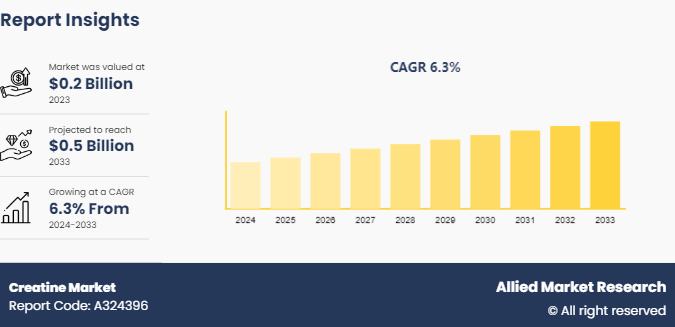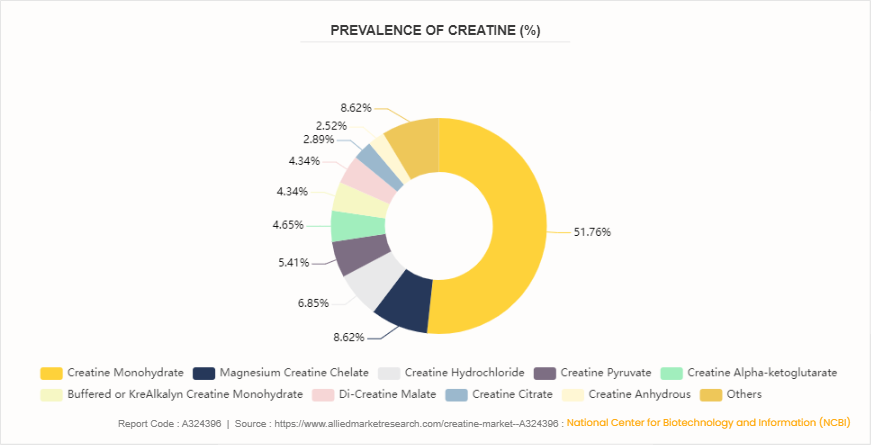Creatine Market Research, 2033
The global creatine market size was valued at $0.2 billion in 2023, and is projected to reach $0.5 billion by 2033, growing at a CAGR of 6.3% from 2024 to 2033. The increasing demand for sports nutrition and performance enhancement among athletes and fitness enthusiasts, rising awareness of creatine benefits for muscle growth and strength, coupled with its use in managing certain medical conditions are the factors which fuels the market growth.

Market Introduction and Definition
Creatine is a naturally occurring compound found in muscle cells, primarily aiding in the production of energy during high-intensity exercise or heavy lifting. It is synthesized in the liver, kidneys, and pancreas from amino acids like arginine, glycine, and methionine. Creatine is stored in muscles as phosphocreatine, which helps regenerate ATP (adenosine triphosphate) , the primary energy carrier in cells. It is widely used as a dietary supplement to enhance athletic performance, increase muscle mass, and improve strength. Popular forms include creatine monohydrate, creatine ethyl ester, and creatine hydrochloride, each varying in absorption rate and efficacy. In addition to its athletic benefits, creatine supplements may benefit people who have neurodegenerative diseases, such as muscular dystrophy, Parkinson's disease, Huntington's disease, and others.
Key Takeaways
The creatine market share study covers 20 countries. The research includes a segment analysis of each country in terms of value for the projected period.
More than 1, 500 product literatures, industry releases, annual reports, and other such documents of major creatine industry participants along with authentic industry journals, trade associations' releases, and government websites have been reviewed for generating high-value industry insights.
The study integrated high-quality data, professional opinions and analysis, and critical independent perspectives. The research approach is intended to provide a balanced view of global markets and to assist stakeholders in making educated decisions in order to achieve their most ambitious growth objectives.
Key Market Dynamics
The creatine market growth is driven by the increasing awareness and acceptance of dietary supplements among fitness enthusiasts and athletes. As more individuals seek to enhance their physical performance, muscle mass, and strength, the demand for effective supplements like creatine grows. In addition, the rising prevalence of gym and fitness center memberships provides a robust platform for the promotion and sale of creatine supplements thereby supporting the market growth.
Furthermore, creatine is being increasingly recognized for its neuroprotective properties, which support brain health and recovery from traumatic brain injuries and strokes thereby supporting growth during the creatine market forecast period. The rise in sports injuries and the need for effective rehabilitation methods further boost the demand for creatine in healthcare. Healthcare providers are also incorporating creatine into treatment protocols for its role in enhancing patient outcomes during physical therapy and recovery phases. Moreover, the increasing consumer inclination towards maintaining health and wellness through scientifically backed supplements has propelled the creatine market size.
Moreover, the medical applications of creatine in managing conditions such as muscular dystrophy, neurodegenerative diseases, and age-related muscle loss broaden its market scope. Innovations in product formulations, such as flavored powders, ready-to-drink liquids, and creatine-enriched snacks, cater to consumer preferences for convenience and variety, thereby provides creatine market opportunity. However, the potential side effects associated with creatine, such as gastrointestinal issues (nausea, diarrhea, or cramping) and concerns about kidney stress, may restrain the creatine market significantly. These side effects deter some individuals from using creatine supplements, particularly those who may be more sensitive or have pre-existing kidney conditions thereby restraining market growth.
Prevalence of Various Creatine Forms
As per an article published by the National Center for Biotechnology and Information (NCBI) in 2022, the analysis of creatine products available on Amazon.com as of January 28, 2022, revealed a significant prevalence of various forms of creatine. Among 175 creatine products reviewed, Creatine Monohydrate emerged as the most dominant form, constituting 82.3% of the products. This is followed by Magnesium Creatine Chelate at 13.7%, and Creatine Hydrochloride at 10.9%. In addition, Creatine Pyruvate constitute a (8.6%) , Creatine Alpha-ketoglutarate (7.4%) , Buffered or KreAlkalyn Creatine Monohydrate (6.9%) , Di-Creatine Malate (6.9%) , Creatine Citrate (4.6%) , and Creatine Anhydrous (4.0%) . An additional 13.7% of the market comprises less common forms such as Creatine Gluconate, Tri-Creatine Malate, Creatine Ethyl Ester, Creatine Phosphate, Creatinol-O-Phosphate, Creatine Ethyl Ester Malate, Free Acid Creatine, and Creatine Nitrate. The dominance of Creatine Monohydrate highlights its widespread acceptance and effectiveness, driving its substantial market share. The variety of creatine forms available reflects the market's effort to cater to diverse consumer needs and preferences, with each form offering unique benefits, such as improved absorption rates or reduced gastrointestinal discomfort. This diversity in product offerings indicates a robust and competitive creatine market, responding dynamically to consumer demand and scientific advancements in sports nutrition.

Market Segmentation
The creatine market is segmented into product type, application, form, distribution channel, and region. On the basis of the product type, the market is segmented into creatine monohydrate creatine ethyl ester, creatine hydrochloride, and others. By application, the market is classified into sports nutrition and medical. By form, the market is divided into powders, tablets, capsules, and others. As per distribution channel, the market is classified into online providers and offline providers. The offline providers segment is further classified into specialty stores, pharmacy stores, and others. Region-wise, it is analyzed across North America, Europe, Asia-Pacific, and LAMEA.
Regional/Country Market Outlook
North America plays a pivotal role in creatine market share owing to high consumer awareness of sports nutrition and fitness supplements. In addition, the strong presence of key market players and extensive research supporting creatine's benefits further drives growth. Asia-Pacific is witnessing rapid growth driven by a surge in demand for sports nutrition supplements due to a growing awareness of health and fitness. This region's dynamic growth trajectory makes it a key focus for creatine manufacturers aiming to capitalize on the evolving consumer preferences and market opportunities. Additionally, improvements in distribution networks and the availability of a wide range of supplement products through online retail platforms have facilitated market penetration.
Industry Trends
As per an article published by National Center for Biotechnology Information (NCBI) in 2023, around 28.6% creatine monohydrate was consumed among female elite football players. This data validates creatine's effectiveness in enhancing athletic performance and muscle recovery, potentially driving the market growth.
Competitive Landscape
The major players operating in the creatine market include Tradichem S.L., AlzChem Group, Chongqing Joywin Naturali Prodotti Co., Ltd, Tiancheng International, NACALAI TESQUE, INC., Merck KGaA, Hefei TNJ Chemical Industry Co., Ltd., AVANSCHEM, KANTO KAGAKU, and Supplement Manufacturing Partner Inc. Other players in creatine market includes Foodchem International Corporation, NUTRICORE BIOSCIENCES PVT. LTD. and so on.
Recent Key Strategies and Developments in Creatine Industry
In May 2024, AlzChem Group AG announced that Creavitalis (pure creatine monohydrate) had a successful launch into the U.S. market in October 2023 at Supply Side West. ?While Alzchem’s creatine sports brand Creapure has long been established as a premium supplement in the sports nutrition and bodybuilding markets, there is an increasing number of applications for creatine as a general dietary supplement. ?
In October 2023, Alzchem Group AG and Crearene AG announced that a clinical study on the use of creatine in dialysis treatments had been launched. The aim is to demonstrate the technical feasibility, patient safety and dose finding of creatine-based dialysis treatment solutions.
Key Sources Referred
- National Center for Biotechnology and Information (NCBI)
- Centers for Medicare & Medicaid Services (CMS)
- National Health Service (NHS)
- Australian Government Department of Health and Aged Care
- Government of Canada's Health and Wellness
- Ministry of Health and Family Welfare (MoHFW)
- National Health Mission (NHM)
- Ayushman Bharat - Health and Wellness Centres (AB-HWCs)
- Centers for Disease Control and Prevention (CDC)
- Food and Drug Administration (FDA)
- National Institutes of Health (NIH)
- World Health Organization (WHO)
Key Benefits for Stakeholders
- This report provides a quantitative analysis of the market segments, current trends, estimations, and dynamics of the creatine market analysis from 2024 to 2033 to identify the prevailing creatine market opportunities.
- The market research is offered along with information related to key drivers, restraints, and opportunities.
- Porter's five forces analysis highlights the potency of buyers and suppliers to enable stakeholders make profit-oriented business decisions and strengthen their supplier-buyer network.
- In-depth analysis of the creatine market segmentation assists to determine the prevailing market opportunities.
- Major countries in each region are mapped according to their revenue contribution to the global market.
- Market player positioning facilitates benchmarking and provides a clear understanding of the present position of the market players.
- The report includes the analysis of the regional as well as global creatine market trends, key players, market segments, application areas, and market growth strategies.
Creatine Market , by Product Type Report Highlights
| Aspects | Details |
| Market Size By 2033 | USD 0.5 Billion |
| Growth Rate | CAGR of 6.3% |
| Forecast period | 2024 - 2033 |
| Report Pages | 233 |
| By Product Type |
|
| By Application |
|
| By Form |
|
| By Distribution Channel |
|
| By Region |
|
| Key Market Players | AVANSCHEM , AlzChem Group, Merck KGaA, Tiancheng International, KANTO KAGAKU, NACALAI TESQUE, INC. , Tradichem S.L., Hefei TNJ Chemical Industry Co.,Ltd., Chongqing Joywin Naturali Prodotti Co., Ltd, Supplement Manufacturing Partner Inc. |
The total market value of creatine market is $0.2 billion in 2023.
The market value of creatine market in 2033 is $0.5 billion.
The forecast period for creatine market is 2024 to 2033.
The market growth is driven by the increasing demand for sports nutrition, rising awareness of creatine's benefits for muscle development and strength, and its use in managing certain medical conditions. Innovations in creatine formulations and delivery methods also contribute to market expansion.
Key trends include the development of innovative creatine formulations (e.g., micronized creatine), increasing use in various fitness and medical applications, growing popularity of plant-based and natural creatine products, and rising consumer awareness of health and wellness benefits.
Creatine is a naturally occurring compound found in muscle cells that helps produce energy during high-intensity exercise. It is also available as a dietary supplement to enhance athletic performance and muscle growth.
Loading Table Of Content...



